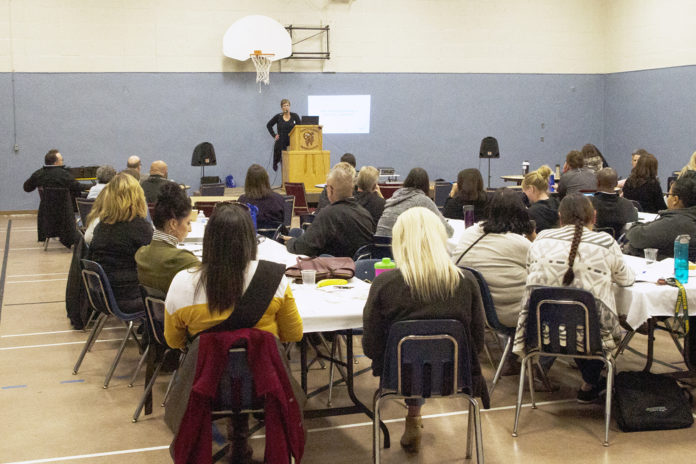
Ronni Nordal knows Saskatchewan has a drug problem.
The Regina-based labour lawyer, speaker and addictions services advocate saw it first hand with her son Andrew and countless others. Confronting that problem is the challenge, and it’s something Nordal and other advocates, experts and community leaders were discussing at Parkland Hall on Friday.
“I am optimistic that people want to make a difference,” she said.
“I hope that they organize another meeting where they actually talk about solutions, talk about what’s the present state in Prince Albert, where we want to get to and how we can get there.”
Nordal spent two hours yesterday walking attendees through her son’s problems with alcohol and drugs, as well as his long, but successful, recovery process. The experience taught her a lot of hard truths, and she’s hopeful communities around Saskatchewan can avoid making the same mistakes.
At the top of the list is a rethinking of how addictions are portrayed. She wants more focus on the fact that recovery is possible, and that it’s done in a community instead of individually.
“Right now we just talk about ‘those addicts,’ and see it as ‘them,’” she explained. “We have to realize that it’s us.”
“Addiction is isolation and recovery is connection,” she added. “You have to connect with other people and live life in recovery.”
However, those aren’t the only problems. As a Métis woman, Nordal is concerned that racism in Saskatchewan is making it harder and harder for Indigenous people to seek treatment. Even when racism isn’t a factor, however, she’s worried addictions programs and services aren’t working as well as they could.
Ideally, she’d like to see better communication between community groups providing addiction services, and a better allocation of resources from all levels of government. She points to the City of Lethbridge, which established a community led drug strategy in less than two years, as a potential model for Prince Albert to follow.
“I don’t think it takes years and years and years,” she said. “It just takes the will to put it into action.”
Nordal was one of 10 speakers at Friday’s discussion. They included representatives from the RCMP, the Métis Addictions Council of Saskatchewan, and Prince Albert’s SCAN (Safer Communities and Neighbourhoods) unit.
Provincial court judge Earl Kalenith, one of several people who assisted in planning the conference, said it’s obvious that addictions is a major issue in Prince Albert. Now, it’s time to create a plan.
As a court judge, Kalenith said he’s not noticing a reduction in the number of drug-related offences. However, has noticed that local residents are taking action.
“Addictions are a huge issues across the province and the police talk so much about that (and) the influence of it in relation to offences,” he said. “Certainly in courtrooms that’s what one sees, but I think there’s an increase in effort given towards ‘what are the treatment resources, what are the ways to be more creative in dealing with those issues.’ I’m quite optimistic that the collective knowledge and effort of people are going to improve the situation.”
Kalenith added that experts believe addictions treatment is more successful when it’s voluntary and not court ordered, so he hopes Friday’s discussion will lead to more accessible services.
“You have other resources in some of the larger centres that look at how the resources can work together better to cover the issue (and) to be more creative,” he explained. “That’s something that I’m not aware of in Prince Albert yet, but one hopes through some of the information gathered from this, that there is a step forward.”

